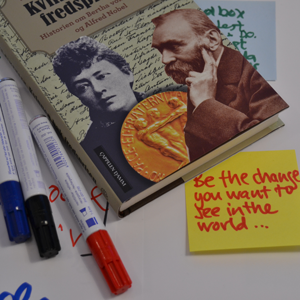
We're facing a paradigm shift in the corporate world these days and in order to meet the changes ahead things need to be done differently. And it all starts with the leaders.
Girls, you know there are moments in time when you should raise your hand. The requirements for being a good leader these days are a perfect fit for abilities many women carry by nature. So come on - step up and claim your spot. The corporate world needs you.
This year it is 100 years since Bertha von Suttner died. She was the first woman receiving the Nobel Peace Price. Remarkable, yes, but few knows that there would probably not be a Nobel Peace Price without her.
Bertha von Suttner met the Swedish scientist Alfred Nobel when she started working for him in Paris in 1875. The status as his employee did not last for long, after only a short time Bertha returned to Austria to rejoin with the love of her life. But this was the beginning of a life long relationship between Bertha von Suttner and Alfred Nobel. Bertha von Suttner's relentless anti-war engagement and the friendship with Alfred Nobel resulted in a focus on peace that carry on until today and hopefully will continue doing so far into the future.

We had the good fortune of being invited to commemorate Bertha Von Suttner in the Nobel Institute in Oslo last week. One of the speakers, philosopher and lawyer Hope Elizabeth May, talked about how the red thread are nesting it all together when it comes to Suttner and other women's role as leaders in the ongoing and necessary peace work. And this is true, not only in peace work, but also as leaders in the corporate world. Because good leadership is what changes the world.
In his speech at the Nobel Institute former Norwegian Prime Minister, Kjell Magne Bondevik, said "If there were more female leaders in the world, there would be more peace." This is probably true because they often represent and use a different approach to life and leadership than what male leaders do.
It is a well-known assumption that if there had been more female leaders in Iceland, their financial collapse of 2008 would never have happened. And it is a fact that they had their impact when re-building the system in record time after the financial meltdown.
This is in line with our own observations working with executive teams. We are aware this is a topic that can be discussed endlessly, but here's why we think that the female way of behaving are more in line with the future of leadership.
Most women are quite empathetic. This makes them emotionally intelligent by instinct. To succeed as a leader in the future there are many things we need to master, but the most important is to engage people. Building emotionally intelligent teams and organizations will be imperative in order to engage people and ensure that we both do the right thing, and do it in the right way. If people are not engaged at work, how are we then going to build the necessary momentum and energy to move forward?
Women have from early times developed an intuitive way of simplifying and doing things easier. Smart leadership is about understanding some basic principles for processes. By breaking down what we do when we work or collaborate with others into repeatable and recognizable methods and processes, it is possible for everyone to move faster and achieve better results. Without spending more energy. It's about working smarter, not harder.
We've met hundreds of leaders who don't realize that leadership is something they need to constantly develop through adapting new methods and skills in order not to become obsolete. However, in general women have less resistance for learning. This is important, because to keep on learning is an imminent part of evolving into a modern leader for the future. We've even talked to many leaders whom at the age of 35 bluntly claim they are fully developed as leaders. And they were all male (sorry for that, guys).
If you're a man reading this, and jumping in your chair right now, you should know this: Of course, we do not mean that it is ONLY women who fit the requirements for becoming leaders for the future. The world is more complex than that. There are male leaders who operate more in line with female-inspired leadership than many female leaders do. There are female leaders who have a more patriarchal leadership style than any male leader we've ever met.
In the end this will hopefully not be a gender issue at all, it will be an issue about which leadership style the world needs to ensure that people, companies, and the world thrive. It is for sure not the general leadership style we see today.
This blog post is also published in the blog LeadershipCourageFun. It is written by Kristine Maudal and Even Fossen, founders of Brainwells and creators of the online leadership program FutureLeadershipNow. We have a common passion for making the corporate world a better place by working with executives and executive teams. Daily we experience magic moments when people exceed their own expectations due to new insights and skills. With love and care we'll share this magic with you. Thank you for being here.
All photos © Brainwells
